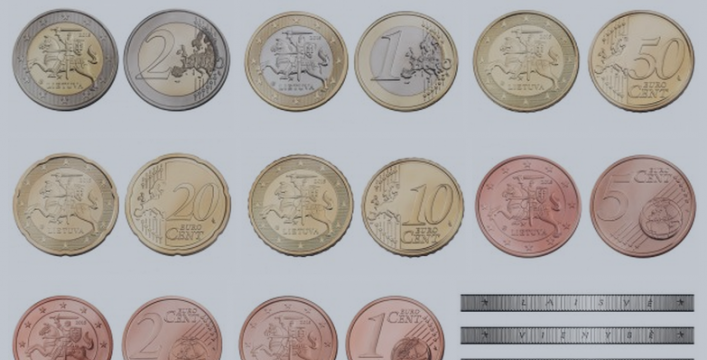VILNIUS, Lithuania — If anyone still has good reasons for joining the euro, it is the people bundled against the cold of this snow-dusted capital.
The plunge of the ruble and economic sanctions have all but destroyed Russia as a market for Lithuanian dairy products and other goods. Russia has been sending patrols of military aircraft over the Baltic Sea recently in what Lithuanians interpret as an attempt to intimidate them. Lithuanian growth, while still well above the eurozone average, has suffered.
The euro, which Lithuania will officially adopt on Thursday, will not solve all those problems. But analysts and political leaders say it should grease commerce, eliminate money-changing costs and help develop new markets to the West.
The new currency may even provide an extra measure of geopolitical security. President Vladimir V. Putin of Russia may be more cautious in provoking a country that is a member not only of the European Union and NATO, but also the eurozone.
The euro gives the country more freedom in negotiating business with Russia, said Valdas Adamkus, who was president of Lithuania for about a decade until 2009.
Continue reading the main storyLithuania Joins Eurozone
200 miles
FINLAND
200 km
SWEDEN
ESTONIA
RUSSIA
Baltic
Sea
LATVIA
LITHUANIA
Vilnius
KALININGRAD
(RUSSIA)
BELARUS
GERMANY
POLAND
CZECH
REP.
UKRAINE
“We don’t have to accept the pressure of being a small country with a little currency,” Mr. Adamkus said. “Now we are members of the eurozone.”
It remains to be seen whether such arguments will help the euro win more adherents in other eastern European countries that have yet to join, like Poland, whose relatively fast-growing economy would provide some badly needed dynamism to the currency bloc. In line with public opinion, Polish leaders are in no hurry to sign up. The eurozone’s prestige could suffer further now that political turmoil in Greece is unsettling financial markets.
Although most of the European Union’s 28 member countries are obliged to adopt the euro, no additional countries are expected to join the currency bloc for at least several years.
Even in Lithuania, enthusiasm about becoming the 19th country in the eurozone is not overwhelming. Recent polls show a majority in favor of adopting the euro, and as recently as September, polls showed most Lithuanians were against membership.
From the start, the euro was the brainchild of political elites and has rarely been greeted with acclaim. Among the most enthusiastic adopters were the Greeks in 2001, when nearly two-thirds were in favor of joining. Especially now, when the currency bloc is still trying to overcome chronically meager growth, the advantages of membership are not always obvious.
Many Lithuanians believe that “we are joining the losing club,” said Ruslanas Irzikevicius, the pro-euro editor in chief of The Lithuania Tribune, an English-language news website. “We are joining the losing club and the problems in the eurozone will affect Lithuania’s prospects." Mr. Irzikevicius emphasized that he was describing a widely held sentiment with which he personally disagrees.
Euro membership is also costly. A study by Lithuania’s central bank found that the changeover would cost 600 million euros, or about $731 million, through 2020 in contributions to the European Union budget, costs to commercial lenders and other expenses.
That is a substantial sum in a country with three million people. “But if you compare with the benefits, the benefits are higher,” Vitas Vasiliauskas, the chairman of the central bank, said in an interview on Tuesday. He predicted that popular support would rise as people get used to the new currency, as happened in neighboring Latvia and Estonia, which are already eurozone members.
Mr. Vasiliauskas and other economists and political leaders argue that there are plenty of reasons for a country like Lithuania to join the common currency, despite the eurozone’s stubbornly slow growth and waning prestige.
The country’s current currency, the litas, has been pegged to the euro for more than a decade. Lithuania tried to join the eurozone in 2007 but was rejected because its inflation rate was too high. Now that Lithuania will be in the eurozone, its banks can borrow money at favorable rates from the European Central Bank, and the country could resort to the eurozone bailout fund in a crisis. Those sources of emergency aid would have come in very handy in 2009, when international credit dried up and Lithuania suffered a severe recession.
“If we had been accepted in 2007, this crisis of 2008 and 2009 would have been much easier,” said Andrius Kubilius, leader of the Christian Democrat party in Lithuania, who was prime minister at the time.
Lithuania will also gain a voice in eurozone monetary policy. Like all heads of national central banks in the eurozone, Mr. Vasiliauskas will become a member of the European Central Bank governing council, which will grow to 25 members.
Lithuania will also join the Eurogroup, the gathering of eurozone political leaders. The Lithuanians “want to be ideal European citizens,” said Anders Aslund, a former Swedish diplomat who is now a senior fellow at the Peterson Institute of International Economics in Washington. “If you’re an ideal European citizen, you want to be at every table, not only the E.U. and NATO, but also the Eurogroup and E.C.B.”
For Lithuanian business, adopting the euro removes the administrative burden and cost of money changing, estimated at €40 million a year, and eliminates any residual risk of a currency crisis. The country can use the boost.
Growth is expected to be 2.9 percent for 2014, while the rest of the eurozone is practically stagnant. Still, Lithuania has arguably been hit harder than any other country by the plunge of the Russian ruble and economic sanctions, which have closed off Russia to Lithuanian food products, an important part of the economy. The euro should make it easier for Lithuania to develop substitute markets in countries like Germany.
Lithuanians are already benefiting from low interest rates, another byproduct of euro membership. Virginijus Sinkevicius, a 26-year-old project manager for the government who has been looking for an apartment to buy, said that banks had told him he would qualify for loans with a variable rate of less than 2 percent.
Many Lithuanians have yet to be convinced of the benefits and worry about higher prices. They equate the litas with stability after a series of economic crises and currency overhauls since the country declared independence from the Soviet Union in 1990. “A country without a currency is nothing,” said Miroslawa Korwel, who was selling inexpensive perfumes at an outdoor market in Vilnius on Monday, when the temperature was far below freezing.
For many ordinary Lithuanians, the euro represents an unsettling change in a country that has had more than its share of upheaval in the last century. Juozas Ruzgys, a 36-year-old Vilnius resident who works in public relations, said he was in favor of the euro, but that his wife’s parents — farmers near the border with Latvia — were nervous about giving up a currency they trust. “For them it’s important that the value doesn’t change,” Mr. Ruzgys said, speaking at a local pub.
In Vilnius, covered with a frosting of snow this week, there was little sense that a momentous change was about to take place. Stores displayed signs in the old and new currencies. At the National Museum Palace of the Grand Dukes of Lithuania, Tadas Balza was one of three guides on staff at an exhibition on the new currency. He said that Lithuanian visitors were often reassured to learn that there will be euro coins imprinted with the Lithuanian national symbol, a knight on a horse.
The changeover to euro bills and coins will be a subdued affair. On Thursday, just after midnight, Mr. Vasiliauskas and other top officials will withdraw the first euro bills from an A.T.M. on Vilnius’s main thoroughfare.
In the Seimas, the Lithuanian parliament, a large majority supported membership in the eurozone. A right-wing party, Order and Justice, has tried to exploit anti-euro sentiment, but has attracted limited support.
Lithuanians who are in favor of the euro equate it with easier travel and commerce, the surveys show. They do not equate it with national security. But Marius Laurinavicius, a senior analyst at the Eastern Europe Studies Center in Vilnius, said he thought that Lithuanians underestimate how much joining the euro will protect them from aggressive moves by Russia, which has recently staged military drills over the border that Lithuania shares with the Russian enclave of Kaliningrad.
“Joining the core of the European Union would make Lithuania much safer from Russian influence and even Russian aggression,” Mr. Laurinavicius said. He added, “We have no other choice.”



